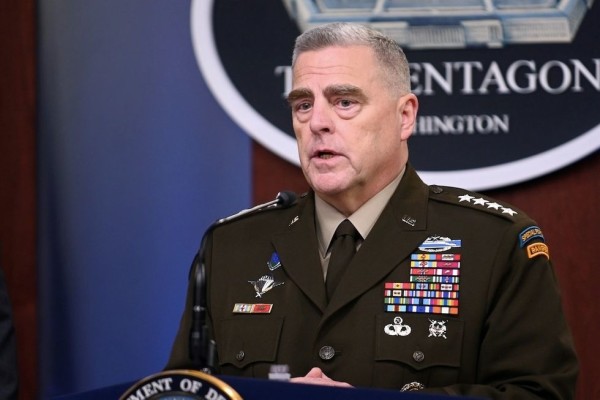

Despite revelations that top U.S. officials have known for years that a military victory in Afghanistan was not possible, the U.S. troops who killed fighting there did not die in vain, said Army Gen. Mark Milley, chairman of the Joint Chiefs of Staff.
“I could not look myself in the mirror,” Miley said during a Pentagon news briefing on Friday. “I couldn’t answer myself at 2 or 3 in the morning when my eyes pop open and see the dead roll in front of my eyes. So, no: I don’t think anyone has died in vain, per se.”
The Washington Post recently revealed that an internal review publicly known as the “Afghanistan Papers” showed that while government officials have given rosy assessments of the war, they privately acknowledged that the U.S. strategy was failing.
One story quotes Milley in September 2013, when he was a three-star general, expressing confidence in Afghan troops and police.
“This army and this police force have been very, very effective in combat against the insurgents every single day. And I think that’s an important story to be told across the board,” Milley said at the time.
On Friday, Milley claimed there was no U.S. government effort to deceive the American public on the truth about Afghanistan because it would be extremely difficult to coordinate so many military leaders, defense officials, State Department employees, and intelligence officers to pull off such an information operation.
The “Lessons Learned” review conducted by Special Inspector General for Afghanistan included interviews with more than 400 officials who were granted anonymity. The Washington Post was able to independently verify the identities of 33 interviewees, including retired Army. Lt. Gen. Michael Flynn, who told SIGAR: “From the ambassadors down to the low level, we are doing a great job. Really? So if we are doing such a great job, why does it feel like we are losing?”
Milley defended his earlier comments about progress in Afghanistan as “honest assessments” based on the facts at the time that were “never intended to deceive either the Congress or the American people.”
He also claimed that the U.S. government has said since 2001 that no military victory in Afghanistan was possible. In fact, Army Gen. John Nicholson, then the commander of U.S. troops in Afghanistan, told reporters in November 2017 that the Taliban was nearing defeat.
“The momentum is now with the Afghan Security Forces and the Taliban cannot win in the face of the pressures that I outlined,” Nicholson said at a Pentagon news briefing. “Again, their choices are to reconcile, live in irrelevance, or die.”
Army Gen. Austin Miller went on to replace Nicholson as the current commander of U.S. troops in Afghanistan. He has not briefed the Pentagon press corps since taking command in Sept. 2018.
Milley was most passionate when Task & Purpose asked him directly on Friday if the U.S. military has been throwing away the lives of troops by sending troops to fight a war in Afghanistan that they knew could not be won on the battlefield.
“Absolutely not,” Milley replied. “Not in my view and I am one who was there, as you said, many, many times.”
Since Oct. 7, 2001, the U.S. military’s mission in Afghanistan has to prevent that country from being used as a staging area for another attack on the United States, according to Milley, who claimed that so far, that mission has been a success.
“Militarily, this has been at a state of strategic stalemate, if you will, where the Taliban cannot defeat militarily the regime – the government of Kabul – so long as the United States and its allies maintain some degree of military support,” Milley said Friday.
“And the regime cannot military defeat the Taliban — or the various other groups over there — so long as they have sanctuary in Pakistan and they have some small degree of popularity amongst the people, which is rated at about 10 to 15 percent or so in some of the rural areas.”
“So this is a very difficult, complicated situation,” Milley continued. “And at the base of it for the United States of America it has to do with our vital national security interest to protect our people. And our soldiers, sailors, airmen, and Marines who have given their lives in Afghanistan have not given their lives in vain, in my view.”
